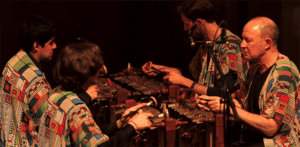Saturday, Mar. 12 at 7:30 p.m. — PUTNEY — Next Stage Arts presents “Gamelan Galak Tika” on Mar. 12 at 7:30 p.m. Tickets are $18 in advance or $22 at the door.

“Gamelan Galak Tika” has been at the forefront of innovative, cross-cultural music for Balinese gamelan since 1993. Led by composer Evan Ziporyn, Galak Tika has performed groundbreaking music at Carnegie Hall, Lincoln Center, BAM, several Bang on a Can marathons, Southern Exposure, the Cleveland Museum of Art, and colleges throughout the Northeast. In 2005 the group toured Bali, performing at the Bali International Arts Festival, Kuta Beach, and numerous villages around the island. Galak Tika is dedicated to commissioning and performing new works by Balinese and American composers, for gamelan and mixed ensembles of gamelan and Western instruments, as well as performing traditional Balinese music and dance. Recent projects have included Christine Southworth’s “SuperCollider” for electronic gamelan and string quartet, Evan Ziporyn’s “Bayu Sabda Idep” for gamelan and strings, and new works by Dewa Alit, Ramon Castillo, and Wilco drummer Glenn Kotche. Galak Tika has recorded for Airplane Ears, New World, and New Albion. The group plays on three complete sets of instruments. These include one traditional pelog set, one tuned in just intonation, and our newest collection, the completely electronic Gamelan Elektrika. “Galak Tika” is Bahasa Kawi (classical Javanese, a dialect of Sanskrit) for “intense togetherness.”
The word gamelan means “to hammer”; the term refers generally to the large percussion orchestras of Java and Bali. The primary instruments are gongs, metallophones and hand drums, with cymbals, vocals, bamboo flutes, and spiked fiddles used as well. Gamelan is the wellspring of all music in Bali, both sacred and secular. The Balinese people are ardent practitioners of a unique form of Hinduism, and gamelan is necessary for all ritual events, as well as to mark any large social occasion. There are dozens of different types of gamelans in Bali, ranging from large metal orchestras to bamboo ensembles, vocal groups, and groups dedicated to the imitation of frog sounds. All the music is marked by the use of one of two non-tempered pentatonic scales, pelog or slendro, and by rhythmically precise interlocking parts known as kotekan.
Gamelan Galak Tika is approximately 30 members strong, drawing membership from MIT students, staff, and community. Their founder and director is Evan Ziporyn, Kenan Sahin, distinguished professor of music at MIT. They rehearse for roughly five hours a week and perform as often as they can. The group learns aurally, without the aid of notation, and functions in the tradition of a Balinese village sekeha, with decisions made communally and responsibilities shared among the members of the ensemble. Since its inception, Gamelan Galak Tika has devoted itself to studying traditional Balinese music and dance and to developing new works by Balinese and American composers. They have given dozens of performances around the East Coast and New England, including Carnegie Hall’s new Zankel Hall, Brooklyn Academy of Music, Lincoln Center, the Boston Museum of Science, Cleveland Museum of Art, Southern Exposure, the Bali International Arts Festival, Boston’s First Night and the Kripalu Yoga Institute, along with universities and high schools. Their programs have included presentations of traditional Balinese repertoire, new works by 20th-century Balinese and American composers, collaborations with Signal, Ensemble Robot, the MIT Shakespeare Ensemble, the New England Conservatory Philharmonia, tai chi master Bow Sim Mark, computer music duo Basso Bongo, and Odd Appetite. Gamelan Galak Tika has given school workshops, offered dance classes, and also devised the first-ever “kecak-along,” a participatory performance in which 1,000 people were taught to shout the interlocking rhythms of the famous Balinese monkey chant. Galak Tika has premiered music and dance works by Dewa Ketut Alit, Ramon Castillo, Nyoman Catra, Glenn Kotche, Desak Made Suarti Laksmi, Midori Matsuo, Joshua Penman, Dan Schmidt, Danielle Smith, Christine Southworth, Pochun Wang, Nyoman Windha, Evan Ziporyn, and Rebecca Zook.
Originally from the village of Pengosekan, Bali, guest director Gusti Komin Darta has been hailed as a leading composer, performer, and teacher of Balinese music of his generation. Born in 1978, he first studied music with his father, renowned musician Gusti Ketut Kerta, and began performing professionally for shadow puppet plays (wayang) at the age of 9. As a teenager, he enrolled at the prestigious national arts conservatory, now known as the Indonesian Institute for the Arts. Gusti Komin is a founding member of the virtuosic Balinese gamelan Çudamani and has toured extensively throughout Europe, Japan and the United States. For 25 years he taught gendér wayang, reyong and kendang instruments to local and foreign students from his family home in Pengosekan, Bali as well as teaching overseas.




